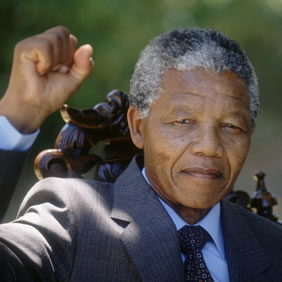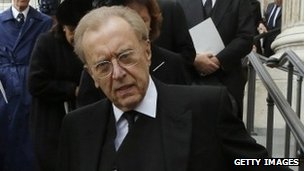Thoughts about death
01/09/13 05:16
I don’t spend much time thinking about dying. It wouldn’t be difficult to do so. I officiate at funerals on a regular basis. I meet with families who have lost loved ones. I am called to the bedside of dying people and have sat with them as they passed from this life. But I would never describe my job as being about death. I am constantly working with the living. Funeral services are, in reality, a process of working with those who are living as they make their journey through grief. There is no need for my words, or even the rites of the church to assist the one who has recently died. That person has already completed a transition and is able to move on to what lies next.
A couple of stories in the headlines this morning, however, sparked my imagination about dying and got me to thinking once again. Nelson Mandela has gone home from the hospital again. He has spent more time in the hospital than out for months, but periodically he is able to return to his home. This time, however, seems a bit different. His condition is listed as serious. He still needs intensive treatment for the chronic lung condition that has laid him low for many months. This last hospitalization lasted for more than two months. Doctors have not said that he is recovering, only that he can receive the care he needs at home. They came short of saying this, but the news reports sound almost as if he has been sent home to die.
 Mandela is a great man. He is a Nobel Peace Prize laureate. He was the first democratically elected leader of South Africa. He overcame the hardship of having been imprisoned for 27 years to lead his nation to a process of peace and reconciliation. But he is not a young man. He turned 95 in July. And he has suffered from chronic lung infections that are due, in part to having contracted tuberculosis while in prison. He has been pretty sick for several years. His last big public appearance was in 2010, when South Africa hosted the World Cup soccer competition.
Mandela is a great man. He is a Nobel Peace Prize laureate. He was the first democratically elected leader of South Africa. He overcame the hardship of having been imprisoned for 27 years to lead his nation to a process of peace and reconciliation. But he is not a young man. He turned 95 in July. And he has suffered from chronic lung infections that are due, in part to having contracted tuberculosis while in prison. He has been pretty sick for several years. His last big public appearance was in 2010, when South Africa hosted the World Cup soccer competition.
It seems that his passage from this life will be in slow motion, with many hospitalizations, complex treatments and a long vigil for his family, the nation he led, and the world that has witnessed his greatness.
 In stark contrast to the way that Nelson Mandela is living the last years and months of his life, BBC news has reported that Sir Davidd Frost, broadcaster, writer and humorist, died suddenly of a heart attack while aboard a cruise ship. Sir Frost was giving a speech aboard the Queen Elizabeth last night when he collapsed and died. No one was expecting his death to come so soon.
In stark contrast to the way that Nelson Mandela is living the last years and months of his life, BBC news has reported that Sir Davidd Frost, broadcaster, writer and humorist, died suddenly of a heart attack while aboard a cruise ship. Sir Frost was giving a speech aboard the Queen Elizabeth last night when he collapsed and died. No one was expecting his death to come so soon.
I have a friend, whose active live was invested in a career as a physician, who is skeptical of the various devices and techniques that have been developed to revive heart attack victims. While acknowledging that CPR and automatic heart defibrillators have saved some from premature death, he also notes that in some cases they merely prolong the process of dying. The victim who might have died quickly, is revived to an extended process of medical treatments that can include surgery, extended stays in the intensive care unit, drugs that have personality-altering side effects, and, in many cases lingering disability and a slow death. My friend once said, “A heart attack is one of the few ways that a person can leave this life with a bit of dignity intact. It seems sad that they would take that away from those who have lived good and meaningful lives.”
I suppose that, given the opportunity to choose, many would choose a sudden death like Sir Frost over a slow and lingering illness leading to death as has been the experience for Nelson Mandela and his family.
But that is the point, it seems to me: we don’t get to choose. Death is not a process of maintaining control. It is, rather a process of surrendering control. In the grand scheme of things the way we die, and even the timing of our death, is not the most important part of the process. Far more important than the way a person dies is the way that person lives. Both Nelson Mandela and Sir David Frost appear to have lived without much fear. They have gone about the process of being contributing citizens to their communities, countries and the world. They have lived with honesty and integrity. And they have not been unduly influenced by fear – not even by the fear of death.
I think that it is best not to know the timing of my dying. And I am comfortable not knowing the way in which I will die. It is likely that, like the majority of people, I will experience some level of disability in advance of dying. I have worked with people who live with disabilities enough to know that there is much they can do and that they have much to contribute in the midst of disability. Although I would not choose disability, I do not fear it. Focusing on the abilities that remain and learning to live as fully as possible in the midst of the realities of life can be an important exercise in living and a way to discover more fully all that life has to offer. I know that my life is richer because of the relationships I have with persons with disabilities. Perhaps I could lend richness to another life were I to become disabled.
We know so little of the true nature of timing. I’ve been with families whose loved ones lived many decades and whose death came with a long warning. They have no less a sense of loss than those who lost loved ones suddenly and unexpectedly. A human life is no less complete if it spans a small number of years. It is not a matter of how much time we are granted, but rather what we do with the time that we have.
So I don’t think I will spend much time thinking about death. The process of living consumes all of the energy that I have.
A couple of stories in the headlines this morning, however, sparked my imagination about dying and got me to thinking once again. Nelson Mandela has gone home from the hospital again. He has spent more time in the hospital than out for months, but periodically he is able to return to his home. This time, however, seems a bit different. His condition is listed as serious. He still needs intensive treatment for the chronic lung condition that has laid him low for many months. This last hospitalization lasted for more than two months. Doctors have not said that he is recovering, only that he can receive the care he needs at home. They came short of saying this, but the news reports sound almost as if he has been sent home to die.

It seems that his passage from this life will be in slow motion, with many hospitalizations, complex treatments and a long vigil for his family, the nation he led, and the world that has witnessed his greatness.

I have a friend, whose active live was invested in a career as a physician, who is skeptical of the various devices and techniques that have been developed to revive heart attack victims. While acknowledging that CPR and automatic heart defibrillators have saved some from premature death, he also notes that in some cases they merely prolong the process of dying. The victim who might have died quickly, is revived to an extended process of medical treatments that can include surgery, extended stays in the intensive care unit, drugs that have personality-altering side effects, and, in many cases lingering disability and a slow death. My friend once said, “A heart attack is one of the few ways that a person can leave this life with a bit of dignity intact. It seems sad that they would take that away from those who have lived good and meaningful lives.”
I suppose that, given the opportunity to choose, many would choose a sudden death like Sir Frost over a slow and lingering illness leading to death as has been the experience for Nelson Mandela and his family.
But that is the point, it seems to me: we don’t get to choose. Death is not a process of maintaining control. It is, rather a process of surrendering control. In the grand scheme of things the way we die, and even the timing of our death, is not the most important part of the process. Far more important than the way a person dies is the way that person lives. Both Nelson Mandela and Sir David Frost appear to have lived without much fear. They have gone about the process of being contributing citizens to their communities, countries and the world. They have lived with honesty and integrity. And they have not been unduly influenced by fear – not even by the fear of death.
I think that it is best not to know the timing of my dying. And I am comfortable not knowing the way in which I will die. It is likely that, like the majority of people, I will experience some level of disability in advance of dying. I have worked with people who live with disabilities enough to know that there is much they can do and that they have much to contribute in the midst of disability. Although I would not choose disability, I do not fear it. Focusing on the abilities that remain and learning to live as fully as possible in the midst of the realities of life can be an important exercise in living and a way to discover more fully all that life has to offer. I know that my life is richer because of the relationships I have with persons with disabilities. Perhaps I could lend richness to another life were I to become disabled.
We know so little of the true nature of timing. I’ve been with families whose loved ones lived many decades and whose death came with a long warning. They have no less a sense of loss than those who lost loved ones suddenly and unexpectedly. A human life is no less complete if it spans a small number of years. It is not a matter of how much time we are granted, but rather what we do with the time that we have.
So I don’t think I will spend much time thinking about death. The process of living consumes all of the energy that I have.